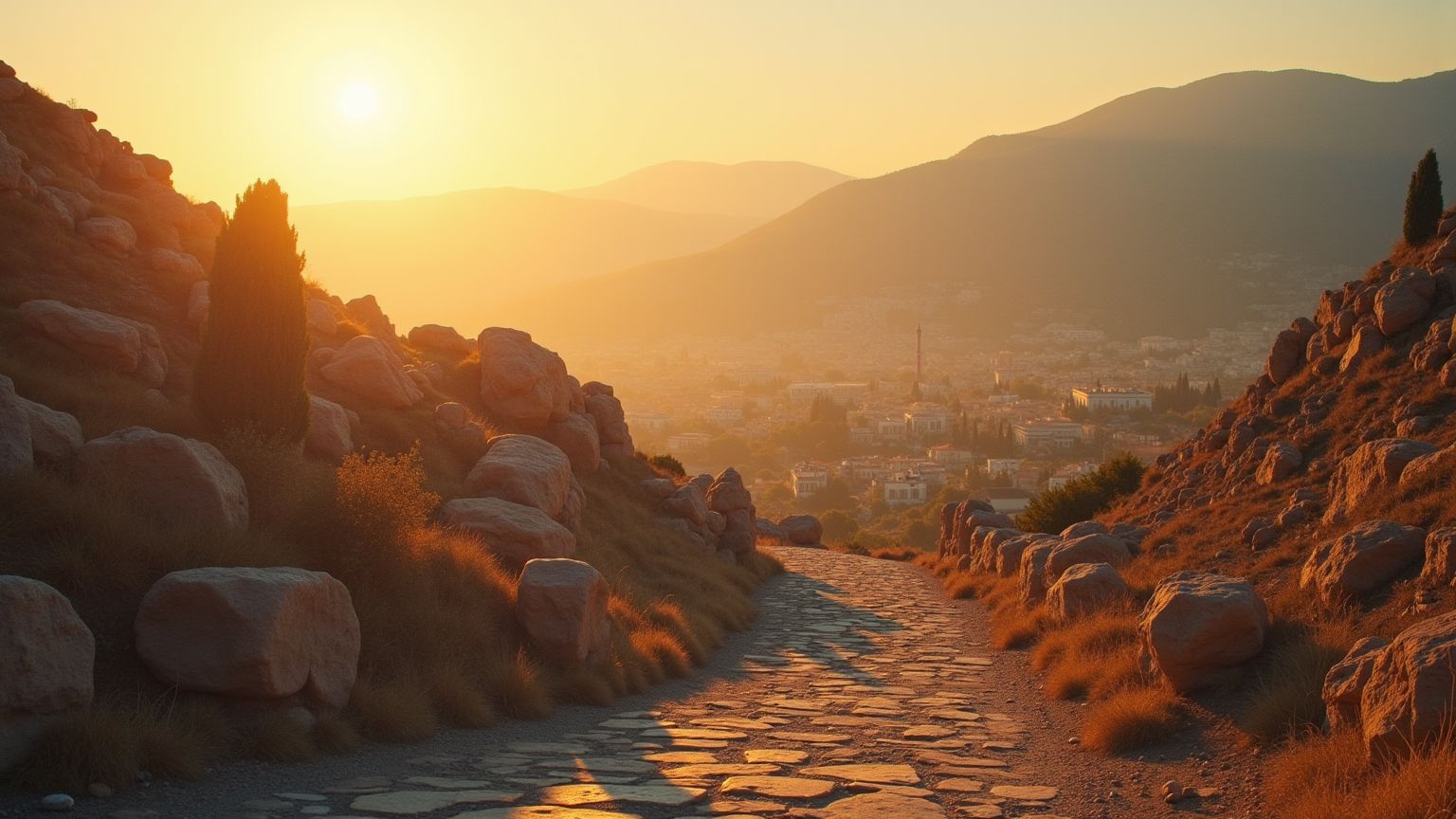15 Mind-Blowing Facts About Sparta in Ancient Greece That’ll Drop Your Jaw
Laconian soil still whispers secrets to those who listen carefully. After spending over a decade guiding wide-eyed tourists through the sun-baked ruins where Spartans once walked, I've seen the same look of surprise countless times when visitors learn the unvarnished truth about these legendary warriors.
Forget what "300" taught you. The real facts about Sparta in ancient Greece would make even King Leonidas raise an eyebrow.
Let me share some authentic insights that even history buffs on my tours find shocking. These aren't your textbook facts about Sparta in ancient Greece – they're the juicy, rarely discussed tidbits that make the ancient world come alive.

1. Spartan Women: Ancient Greece's First Feminists
While Athenian women were basically glorified houseplants, Spartan ladies were busy owning property, speaking their minds, and getting ripped at the gym.
No joke – these women could inherit land, manage estates, and participate in athletics that would make modern CrossFit enthusiasts weep. They wrestled, threw javelins, and ran races, sometimes in the buff just like their male counterparts.
I've watched tourists gasp when I show them the training grounds where teenage girls once grappled and competed. As Plutarch noted, Spartan women were the only ones in ancient Greece who could "talk back to their husbands and get away with it!" Now that's what I call girl power before it was cool.
2. Only a Tiny Fraction Were Actually "300" Material
Here's a mind-bending fact about Sparta in ancient Greece: those ripped, shield-bearing warriors? They were the ancient equivalent of the 1%.
The true Spartan social pyramid looked like this:
- Homoioi ("Equals") - The elite citizen-warriors (about 10% of population)
- Perioikoi - The middle-class merchants and craftsmen
- Helots - The enslaved majority who did all the actual work
Those legendary warriors couldn't have existed without an army of subjugated workers handling the boring stuff like, you know, growing food and making clothes. When I explain this to visitors standing where ancient Spartans once drilled, their perception of "THIS IS SPARTA!" gets a serious reality check.
3. They Were Secret Poetry Lovers
Bet you didn't see this coming in your facts about Sparta in ancient Greece lesson! Before they went full military-state, Spartans were actually artsy types.
Early Sparta produced some genuinely beautiful stuff:
- Delicate ivory carvings that required surgeon-like precision
- Bronze work that would make modern sculptors jealous
- Poetry performances that could move hardened warriors to tears
The poet Alcman was like the ancient Spartan equivalent of a rock star, composing pieces that would have crowds swaying together. And even during their most militaristic period, Spartans marched to battle accompanied by flute music—not exactly the heavy metal soundtrack you'd expect.
Sometimes on my tours, I recite surviving fragments of Spartan poetry. The emotional depth makes people do a double-take: "Wait, these war machines wrote THAT?"
4. Their Money Was Intentionally Terrible
In what might be history's weirdest economic experiment, facts about Sparta in ancient Greece reveal they deliberately created the world's most inconvenient currency.
They made their coins from iron, dipped them in vinegar to make them brittle and useless for anything practical, and made them so ridiculously heavy you'd need a wheelbarrow to buy a decent meal.
I keep a replica of these "obeloi" coins in my tour pack. When I hand it to visitors, they always say the same thing: "How did anyone shop with these things?" Exactly the point! It was anti-materialism enforced by terrible user experience design.
5. Spartan Helicopter Parenting Started at Birth
Think your parents were strict? In Sparta, ancient Greece's helicopter parenting began with a literal death panel.
Newborns faced a group of stern-faced elders who decided if they were "fit" to join Spartan society. Those deemed too weak supposedly took a one-way trip to the ravines of Mount Taygetus. (Modern historians debate whether this infanticide was actual practice or exaggerated propaganda, but still—yikes.)
By age seven, boys were yanked from their crying mothers and thrown into the agoge—a combination of boot camp, boarding school, and "Survivor: Extreme Edition." But here's a surprising fact about Sparta in ancient Greece: alongside learning to stab things properly, these kids also studied reading, writing, music, and public speaking. The original well-rounded education, just with more bloodshed than your average elementary school.
6. Their Political System Was Shockingly Modern
Forget one-man rule. Sparta operated with a political system so full of checks and balances it would make a constitutional lawyer weep with joy.
Their government featured:
- TWO kings (from rival families, naturally)
- A council of 28 elders (the Gerousia)
- Five annually elected supervisors (Ephors)
- A citizens' assembly
This wasn't just ancient bureaucracy gone wild—it created remarkable stability. When I'm standing with tourists at the remains of Sparta's civic buildings, I love pointing out how their political structure prevented anyone from gaining absolute power—a lesson some modern nations could stand to relearn.
7. Their Marriage Rituals Were Pure Weirdness
Among the strangest facts about Sparta in ancient Greece: their wedding nights would qualify as serious dealbreakers in modern relationships.
Here's the typical Spartan honeymoon experience:
- Bride gets her head shaved
- Bride puts on men's clothing and waits alone in a dark room
- Groom sneaks in, does the deed, and sneaks back to barracks
- This "marriage by kidnapping" arrangement continues for YEARS
Young husbands continued living in military barracks, visiting their wives under cover of darkness like some weird dating arrangement. According to Plutarch, this absence made hearts grow fonder and "kept passion burning." Ancient Greek marriage counseling at its finest!
8. They Lived in Constant Fear of Servant Uprising
Nothing shaped Spartan paranoia quite like being massively outnumbered by people who hated them.
The helots—state-owned serfs who worked Spartan lands—outnumbered citizen Spartans by as much as 7 to 1. This wasn't just an interesting demographic fact about Sparta in ancient Greece—it was an existential terror that shaped their entire society.
Every year, Spartan officials literally declared war on their own servant population, making it temporarily legal to kill troublesome helots without religious pollution. They even had a secret police force called the Crypteia where young Spartans would assassinate any helots who seemed like potential rabble-rousers. Talk about workplace hostility!
9. They Encouraged Stealing (But Not Getting Caught)
In what might be history's weirdest parenting technique, Spartan boys were actively encouraged to steal food—and then brutally punished if caught.
This wasn't teaching criminal skills but developing stealth, resourcefulness, and hunger management—all crucial for soldiers who might need to forage behind enemy lines.
I often tell my tour groups about the famous boy who stole a fox, hid it under his cloak, and when confronted by a teacher, let the animal claw his stomach to ribbons rather than admit theft. The story always prompts uncomfortably nervous laughter and muttered "what the actual...?" from parents in my groups.
10. These Warriors Were Religious Fanatics
Here's a surprising fact about Sparta in ancient Greece: these ultimate warriors were total sticklers for religious protocol.
Sparta's kings doubling as high priests performed sacrifices before any campaign to check if the gods approved. Bad omens? Sorry, invasion canceled! They regularly delayed or aborted military operations because some priest spotted birds flying in the wrong direction.
This religious devotion led to some fascinating historical what-ifs:
- They missed the Battle of Marathon because a festival wasn't finished
- Only 300 Spartans initially went to Thermopylae because most were attending the Olympic Games
When I point out Sparta's temple ruins, visitors often struggle to reconcile these superstitious traditionalists with their image of pragmatic warriors.
11. Their Diet Would Make Modern Nutritionists Scream
The infamous Spartan "black broth" deserves special mention in any collection of facts about Sparta in ancient Greece.
This culinary nightmare was reportedly so disgusting that a visitor from Sybaris (ancient Italy's version of Beverly Hills) tasted it and said, "Now I understand why Spartans don't fear death." The recipe? Pork, blood, salt, and vinegar—basically congealed blood soup with a dash of sadism.
Young Spartans in training were deliberately underfed to encourage "resourcefulness" (aka stealing) and to develop tolerance for hunger. The only exception was before battle, when warriors finally got decent portions. Nothing says "tomorrow might be your last day" like suddenly getting adequate nutrition.
12. They Invented Social Death for Cowards
In Sparta, showing fear was worse than dying. Those who fled battle became "tremblers" (tresantes)—walking ghosts in their own society.
These unfortunate souls endured a social death so complete it makes modern "cancellation" look like a minor inconvenience:
- Had to yield right-of-way to everyone (even children)
- Couldn't marry into decent families
- Had to wear patched, mismatched clothing as public shame markers
- Could be struck by anyone without having the right to defend themselves
Standing at ancient battlefields, I often ask my tour groups: "Would you rather die fighting or live with that level of humiliation?" The uncomfortable silence speaks volumes.
13. Their Fabulous Hair Was Military Strategy
Among the more fabulous facts about Sparta in ancient Greece: these warriors were deadly serious about their hair care routine.
Unlike other Greeks who preferred practical short cuts, Spartan men grew their hair long and luxurious. Before battle, they'd meticulously comb and arrange these flowing locks—not vanity, but psychological warfare. According to Xenophon, Lycurgus decreed long hair made men "appear taller, more dignified, and terrifying."
Picture this: You're a Persian soldier about to face Spartans. As you prepare to fight, you see your enemies... doing their hair? It's either absurdly vain or terrifyingly confident. Either way, it messes with your head before the battle even begins. Ancient psychological warfare at its finest!
14. Their City Had No Walls (On Purpose)
In an era when every city worth its salt built massive defensive walls, Sparta said "nah."
When asked why Sparta had no walls, they famously replied: "Our men are our walls." This wasn't just macho posturing—it was strategic genius disguised as bravado. With no walls to hide behind:
- All citizens stayed combat-ready
- No possibility of siege warfare
- Enemies had to face them in open battle (where Spartans excelled)
- It projected supreme confidence to potential attackers
Standing at the archaeological site with tour groups, the absence of fortifications still feels shocking. It's one of those facts about Sparta in ancient Greece that perfectly captures their unique worldview: absolute faith in their military system over physical defenses.
15. They Collapsed Due to Stubborn Economic Policy
The final, ironic fact about Sparta in ancient Greece: they weren't defeated by superior warriors but by their own rigid economic system.
Their bizarre rules:
- Elite Spartans forbidden from trade and commerce
- Land difficult to buy, sell, or divide
- Citizenship tied to land ownership
- Laws against accumulating gold and silver
Over generations, wealth concentrated among fewer families, marriages declined, and the citizen population plummeted from about 8,000 to fewer than 1,000 in just a century. By the time Thebes finally defeated them at Leuctra in 371 BCE, Sparta was already hollow inside.
When showing visitors late Spartan architecture, I always note the irony: the culture obsessed with physical strength ultimately died from economic inflexibility.
Experience the Real Sparta Beyond Hollywood Myths
These lesser-known facts about Sparta in ancient Greece paint a picture far more fascinating than any stylized movie. They were progressive on women's rights yet brutally oppressive to their servants. Military-obsessed yet deeply religious. Disciplined warriors who wrote sensitive poetry.
Walking through Sparta's ancient stones, you can still feel the contradictions that made this civilization so uniquely compelling. The archaeological remains may not match Athens' grandeur, but the stories they contain are just as captivating.
If you're planning a Greek adventure, don't skip Laconia. Standing where real Spartans once trained, governed, and lived offers insights no documentary can capture. And trust me—the authentic facts about Sparta in ancient Greece are far wilder than anything Hollywood could invent.
Like my tour groups always say after learning these surprising truths: "THIS IS SPARTA!" But not the one they thought they knew.








